- Home
- Diana Wynne Jones
Power of Three Page 18
Power of Three Read online
Page 18
“We did not drive you into the water!” Ceri said. “You were always there.”
“No we weren’t,” Hafny said, seriously and quietly. “Once we lived on the land like the Giants do.”
He was clearly trying to smooth things over. But his reasonable tone irritated Gerald, as it had done all along. “Well, what do you want me to do about it— apologize?” Gerald demanded, so thunderously that Hafny flinched. “That all must have been thousands of years ago. We’re all here now. And we’ve all got a right to live on the Moor if we want!”
At that, Brenda’s resentment of Gerald flared up. “Who says?” she said in her piercing Giant voice. “Your people came with the Normans and pinched the Moor off us! My folks were here from the year dot—or before that. If anyone’s got as much right here as the Lymen and the Dories, it’s me, and not you, Gerald Masterfield!”
“No you haven’t,” said Halla.
“If nine hundred years isn’t long enough, what is!” roared Gerald.
Gair, with his ears quivering, looked round their angry faces and felt really frightened. It was not merely that the talk had not got anywhere. It was rapidly getting out of hand. He had counted on Gerald to behave in the reasonable Giant manner, but Gerald was fast getting violent. And Hafny, who was behaving reasonably, was irritating everyone with his dry assurance. Gair saw that it was stupid to expect anything else, when they were all gathered in a house shot through with the dark influence of that collar. Their age-old differences were being aggravated into personal dislike. Gair was about to suggest that they go outside to talk, when a sudden perception came to him. Ayna, Brenda and Halla were glaring, Brenda at Gerald, Ayna and Halla at one another. Each had her head tilted in identical angry haughtiness. And it did not matter that Brenda’s face was wider and pinker than Ayna’s, or that Halla’s eyes were yellow where Ayna’s were blue. They were all faces. And the hair that grew from the heads of each, though it varied from silvery to dark straw, was the same kind of hair.
“Have you noticed,” Gair said loudly, “that we’re all people really?” All the faces turned to him, surprised and wondering, Gerald’s, Ceri’s and Hafny’s as well as the girls’. “I mean,” Gair explained, “that we’re all far more like one another than—well, dogs or spiders.”
“I should hope so!” said Halla. But they all turned and looked at one another thoughtfully.
“I see what you mean,” said Gerald.
“Five fingers,” said Ceri. “Giants’ are thicker and Dorigs’ longer, but we all have five. You mean we’re all the same underneath?”
“Are you people warm-blooded?” Gerald asked Hafny.
“Of course,” said Hafny.
“But what about the way they can change shape?” Brenda asked. She sighed. “I can’t.”
“I’ve been wondering about that,” said Gair. “Do you,” he asked the two Dorig, “do it by thinking? Or how?”
Halla and Hafny looked uncertainly at one another. “I—I think so,” Hafny said. “It’s—well, it’s a bit like moving your leg or your arm, really.”
“Only much harder,” said Halla. “You have to concentrate. And you feel tired if you keep it up for long.”
“Particularly if you shift to something bigger than you are,” said Hafny. “Yes, I suppose you think in a certain way, and it happens.”
“Like my Thoughts,” Ceri said.
“That’s what I meant,” said Gair. “Ceri, I bet you could shift shape if you turned your Thoughts on yourself.”
Ceri’s mouth fell open. “I’d never dare.”
“You’re not even to try,” said Ayna. “Suppose you stuck! Gair, really!”
“People don’t usually stick,” Hafny said encouragingly.
“He’s not the same as you!” Ayna said crossly.
“But he is—in a way,” said Gerald. “That’s what Gair’s getting at. There are stories about people—er, Giants— doing it, too. Werewolves and suchlike. It’s not very common among us, but there is that chap who breaks forks, and they say some—er—Giants can see into the future a bit. Is that the sort of thing you’re talking about, Gair?”
“Yes,” Gair said thoughtfully. “I think we must all descend from the same stock.”
“You mean you—some of us—are mutants,” Brenda said wisely.
“Only, which of us is normal?” said Gerald. “Suppose we’re the mutants, Brenda?”
Before the two Giants could indulge in more theories, Hafny firmly interrupted. “I’m sorry,” he said, “but it’s the differences between us that are important. You’d better get that clear.” Somehow, they gathered from his manner that the talk was likely to get somewhere at last. Hafny did not seem unfriendly, but he was very much in earnest as he said, “Giants and Lymen and us are all different. We all want different things. We usually leave you Giants alone to quarrel among yourselves, and occasionally some good for us comes out of it. And it has now, because the Moor is going to be flooded, just when we need more room most. You see, it isn’t simply that there are more of our people every year. About fifteen years ago, the places in the West called the Halls of the Kings filled up with water. Water came in where the air should have come in, and no one could pump it out. So everyone had to leave and come to the halls here. There were thousands of them—”
“Just a moment,” Gerald interrupted. “How big are these Halls of the Kings?”
“I’ve never been there,” Hafny said cautiously. “But I believe they were enormous.”
“And where are they?” Gerald asked eagerly.
“Under some chalk hills,” said Hafny. “That’s what caused the water, they say—a fault in the chalk. I’ve heard that the Giants call that part the Downs.”
“Which Downs? Berkshire or Sussex?” Gerald demanded, thoroughly excited. “And would you say there was a lot of water?”
“A great deal of water,” Hafny said wryly. “People drowned. But those names mean nothing to me, I’m afraid.” Gerald, red in the face with excitement, made an annoyed noise. Hafny looked at him in a way that was both shrewd and satisfied. Gair could have sworn he had told Gerald this deliberately, hoping to arouse just the interest he had aroused. Hafny was plainly a deep one. Gair was wondering just what Hafny was playing at, when Hafny looked at him. “Now we come to the Lymen,” he said.
“We hadn’t anything to do with the Otmounders attacking the fugitives,” Ayna said.
“I wasn’t meaning that,” said Hafny.
“In that case,” Halla said warningly, “you’d better not say any more, Hafny.”
“Yes I shall,” said Hafny, losing his dryness and becoming simply a younger brother arguing with his elder sister. Gair was fairly sure by now that Halla was Hafny’s elder sister. “I’m going to tell them because I owe it them. Try and stop me.” He turned to Ayna, Gair and Ceri. “The fact is, the bad wells in Garholt are just an excuse, I think. My father has sworn not to leave a Lyman alive on the Moor. If you want to live, you’ll have to leave the Moor. If you stay, you’ll be killed before you’re drowned. Find your father and tell him that.”
Gair could see Hafny meant this. A gust of dismay swept over him, as he thought of the prisoners in Garholt.
“Gair,” said Ayna, “we must go and find Father straightaway.”
“You can’t,” said Gerald. “Unless—Are they still chasing them—the ones who were after them yesterday?” he asked Hafny.
Hafny shrugged. Shrugging, Gair was beginning to think, was very characteristic of Dorig. “No. My father called that off,” he said, to their great relief. “I told you, we leave Giants alone. My father thought the Giants would kill you anyway.”
“Who is your father?” said Brenda. “Chief Dory or something?”
Halla’s chin lifted proudly. “He’s the King.”
“Well, fancy!” said Brenda.
“Halla,” said Hafny, “you shouldn’t have told them that.”
“Why not?” said Halla. “We’ve unhooded to them.”
>
“But none of them have hoods.” Hafny shrugged again as he looked round the table. “I expect you’re all thinking what good hostages we’ll make.”
“It never crossed my mind,” Gerald said, rather angrily. “We promised to let you go.”
Gair was glad Gerald had chosen to behave with Giant honorableness. For a moment, he had been very tempted. Yesterday the Dorig had been rounding up children with gold collars, no doubt to use as hostages. It would turn the tables splendidly if today those same children took the King’s son prisoner and sent the King’s daughter with the news. It would be that way round, Gair knew. Nobody cared for Halla, but Hafny was interesting. Gair would have liked to have known him better. But it was not to be. Gair looked regretfully at the two Dorig. That they were King’s children explained a lot. It explained Halla’s haughtiness and Hafny’s queer self-confidence, and the way both seemed to speak for the entire Dorig race. It explained their splendid collars. But one thing it did not explain was why Hafny felt he owed them his warning.
“Before you go,” Gair said, and he put it that way so as to place temptation firmly behind him. “Before you go, why did you say you owed us that warning?”
He was surprised to find Hafny blushing the pale pink Dorig blush—though less surprised when he also shrugged. “Well, it’s your father I owe really,” Hafny said uncomfortably. “I think he was your father, from the collar and the likeness. That’s how I came to have your name. Ceri kept saying it—but perhaps you don’t remember. It was the day we flooded Otmound. You were out hunting and I was—well, I’d got into trouble and run away.”
“He keeps doing that,” Halla said, in a weary, elder-sisterly way.
“So what? I did it last year. Sometimes you get mad,” Gerald said.
“I did it, too,” said Gair. “Go on.”
“I walked most of the night,” said Hafny, “and about dawn your hunt came by, and I had to hide in a pool. I stayed under until I’d no air left. I couldn’t feel any more footsteps, so I came up and hoped. And the first thing I saw was you dragging Ceri along and both of you armed to the teeth.”
Ceri’s face was brilliant red, and Gair knew his own was the same. “You mean that was you?” Ceri said. “We were scared stiff!”
Hafny laughed. “I know,” he said. Gair, looking at Hafny laughing, wondered if he would ever understand the Wisdom. The Wisdom said Dorig were ruled by Saturn, as Gerald seemed to be, but Gair knew that if he had ever seen anyone ruled by Mercury, it was Hafny. “I was quite as scared,” Hafny said. “I didn’t think, I was so frightened. I just shifted straight to a deer. And of course you both did your best to kill me. I was still so frightened that all I could think of doing at first was to get bigger. And I got to the point where I was so thin on the ground I couldn’t move, and you still didn’t run away. So I thought of shifting to a warrior. That meant I was still pretty thin on the ground and I couldn’t speak—it’s hard to talk if you’re spread out—so I just walked at you and prayed to the Powers you’d run away now. And you wouldn’t. I’d never met anyone so maddeningly brave. And before I could think what to do, your whole hunt was all round me. I thought my last hour had come, because they always tell you Lymen kill you at once if they find you on your own, and I couldn’t speak, and I was spread so thin it hurt—I’ve never felt so horrible in my life. Then your father told me I could go. I’ve never been so grateful to anyone. I was back in that pool before I knew I’d moved, and I lay there and swore I’d do something in return if I could.”
It was queer to have the story from the other point of view. Ceri and Gair were exchanging uncomfortable looks, when Halla made Gair even more uncomfortable by saying:
“And I suppose you’ve been following Gair around ever since?”
“Not all the time,” Hafny protested, looking as uncomfortable as Gair felt. “Mostly here, when you were watching the Giants. We watch you quite a bit,” he said to Brenda and Gerald.
Gair felt foolish. He remembered that squirrel when he had been in the wood, and he prayed to the Sun that Hafny had not chanced to be near the time he had walked along the dike shouting to the Dorig to come and get him.
“Flipping follow-my-leader,” Gerald said. “Why on earth couldn’t somebody have talked to somebody before now?”
“Do you think it’s done any good?” Hafny asked him, as if he was hoping for something.
There was a gloomy pause. “No one’s talked about that collar yet,” Ayna remarked. As soon as she said it, Gair felt the collar break into pulsing life—as if it had been dormant and Ayna’s words had wakened it again.
Chapter
13
“WHAT COLLAR?” SAID HALLA.
“It’s a Dorig collar,” Ceri said. “You can see it is. The work’s the same, and both theirs have birds’ heads in front, too.” And he explained that it had a curse on it and that Gest seemed to have given it to Gerald’s father years ago.
The Dorig were interested but puzzled. “I never heard of a curse,” said Halla.
“Where is this collar?” Hafny asked.
Brenda’s face glowed. She wrung the maximum drama out of the answer. “In this very house!”
She annoyed Gerald heartily. He said, far more casually than he felt, “I’ll show you if you like.”
“All right,” said Hafny.
So Gerald led them all to the study, where Halla and Hafny stared round as curiously as Ayna and Ceri had done the day before. The cold blast of power from the collar made Gair feel ill. When Gerald opened the drawer, he had to hold onto the back of a chair and clench his teeth.
“Oh!” Brenda cried out, enchanted by the richness of the thing, its greenness and its beauty. She put out a large mauve hand to pick it up.
“Don’t touch it!” shouted everyone else in the room.
Brenda snatched her hand back, looking puzzled and hurt. “Why ever not?”
“The curse will come off on you,” said Halla. She and Hafny were almost as badly affected as Gair. They both stood sideways to the drawer, as if they could not bear to look at the collar straight on, and both had gone pale. When Dorig went pale, they went ashy.
“Yes, it’s cursed all right,” Hafny said. “As strong as could be.”
He and Halla snatched sidelong looks at the collar. “Hafny,” Halla said. “Owls belong to our family. Whose could it have been?”
“I don’t know,” said Hafny, looking like death. “The work doesn’t look all that old. Halla, do you realize? This room must be right above our halls.”
Halla’s hands went to her thin white cheeks. “Powers! Then it must be causing our troubles, too! Where did it come from?”
“Otmound,” said Ayna. “We think.”
“Father hates Otmound,” said Halla.
“Do you know how we can get the curse off it?” asked Gerald. “You’re not the only ones it’s making trouble for.”
To Gair’s disappointment, both Dorig shook their heads. “I know you can’t destroy a thing that’s cursed,” said Halla. “You have to lift the curse first. How to lift a curse is one of our Songmen’s secrets. We could take it to them—”
“No!” said Hafny. “Put it away. Shut it up. Let’s go.”
Gerald, rather pale himself, slammed the drawer shut. Immediately, Gair felt better and the two Dorig recovered their color. But none of them felt particularly happy as they trooped away into the hall, except Brenda. Brenda was brimming over with excitement.
“Oh,” she said. “It was lovely. Evil beauty!”
“Shut up!” growled Gerald. “I suppose you two want to go now?”
“Yes please,” said Halla. “If you could take the Thought away.”
Ceri concentrated briefly, and Halla and Hafny both disappeared in a wave of cold air. The rest looked round the hall in bewilderment. Then Brenda nearly stepped on a mouse. She recoiled with a squawk, and all but tramped on another.
“You’ll get squashed, you stupid fools!” said Ayna.
The next moment, the mice were piling into gray pillars in that way that Gair thought he would never get used to, not if he lived among Dorig for the rest of his life. Hafny and Halla hardened out of them, laughing.
“Funny how Giants are always scared of mice!” Hafny said.
“You wouldn’t think it so funny if I’d stepped on you,” Brenda told him angrily.
Gair found he had come to a decision. How he had reached it, he was not sure. He did not think that the collar in the drawer was at the moment pulsing with evil, and that, of all the people there, he was the most responsive to it. He simply knew he had decided. “Hafny,” he said, “could I talk to your father? Would you take me to him?”
There was a shocked silence in the hall. Then everyone began telling Gair at once he was insane. Halla went off into hissing laughter. But Gair ignored them and watched the expressions on Hafny’s narrow face. Hafny looked surprised, alarmed and rather scared, but he did not seem, like Halla, to find the idea ridiculous. Gair might have thought, but he did not, that Hafny was almost as sensitive to the collar as he was himself. What he thought instead was that, in his queer way, Hafny was honorable; that Dorig, now he knew a little more about them, were not as alarming as he thought; and that the Giant way of talking was worth trying on the King.
“You’d be taking a risk,” Hafny said at length. “I think you’d be better off going to find your father. What would you want to say?”
“Hafny, you’re not going to agree!” Halla exclaimed.
“Gair, you are not to go,” said Ayna. “We should have gone to find Father hours ago.”
“You must do that,” Gair said. “Go as soon as I’ve gone, and I’ll come to Garholt when I’ve seen the King. I’d like,” he said to Hafny, “to ask your father to make peace. I’ll be a hostage if necessary.”
“No. Be a messenger,” said Hafny. “No one hurts messengers.”
“All right,” said Gair. “Would you mind if I took the collar with me and asked your Songmen how to raise the curse?”

 Fire and Hemlock
Fire and Hemlock Reflections: On the Magic of Writing
Reflections: On the Magic of Writing The Game
The Game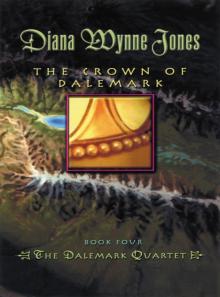 The Crown of Dalemark
The Crown of Dalemark Deep Secret
Deep Secret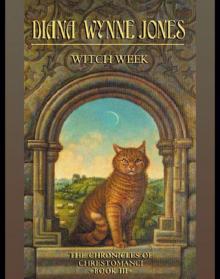 Witch Week
Witch Week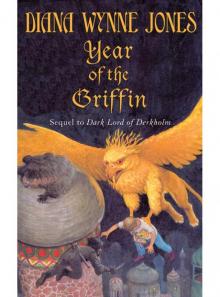 Year of the Griffin
Year of the Griffin Wild Robert
Wild Robert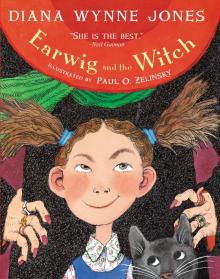 Earwig and the Witch
Earwig and the Witch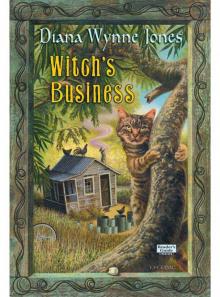 Witch's Business
Witch's Business Dogsbody
Dogsbody Caribbean Cruising
Caribbean Cruising Cart and Cwidder
Cart and Cwidder Conrad's Fate
Conrad's Fate Howl's Moving Castle
Howl's Moving Castle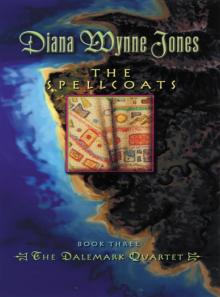 The Spellcoats
The Spellcoats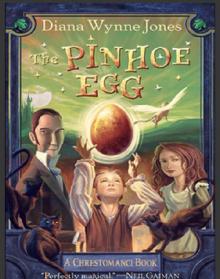 The Pinhoe Egg
The Pinhoe Egg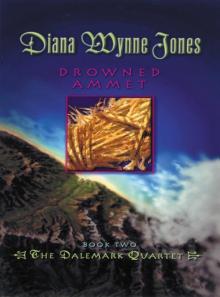 Drowned Ammet
Drowned Ammet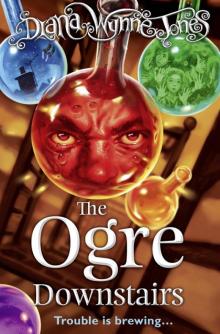 The Ogre Downstairs
The Ogre Downstairs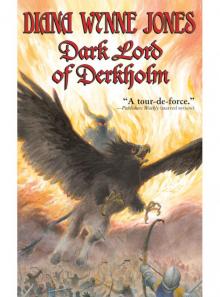 Dark Lord of Derkholm
Dark Lord of Derkholm Castle in the Air
Castle in the Air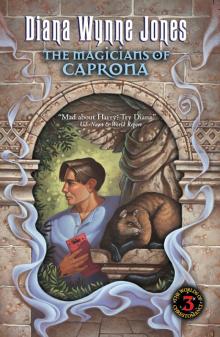 The Magicians of Caprona
The Magicians of Caprona A Tale of Time City
A Tale of Time City The Lives of Christopher Chant
The Lives of Christopher Chant The Magicians of Caprona (UK)
The Magicians of Caprona (UK)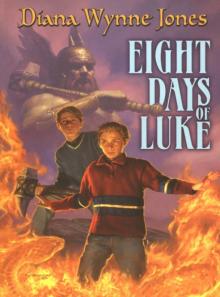 Eight Days of Luke
Eight Days of Luke Conrad's Fate (UK)
Conrad's Fate (UK) A Sudden Wild Magic
A Sudden Wild Magic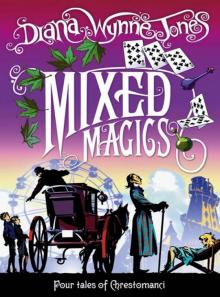 Mixed Magics (UK)
Mixed Magics (UK)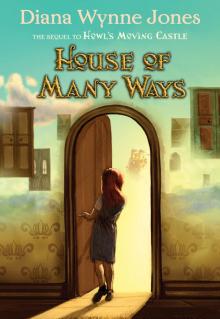 House of Many Ways
House of Many Ways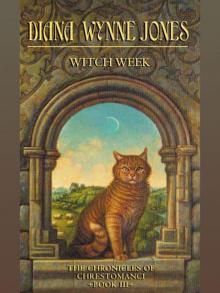 Witch Week (UK)
Witch Week (UK) The Homeward Bounders
The Homeward Bounders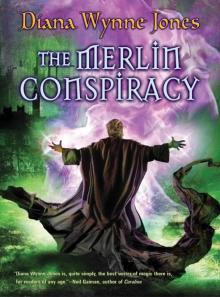 The Merlin Conspiracy
The Merlin Conspiracy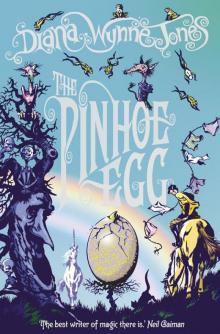 The Pinhoe Egg (UK)
The Pinhoe Egg (UK)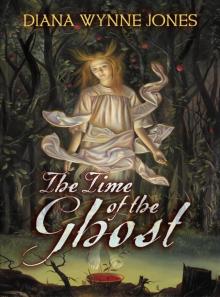 The Time of the Ghost
The Time of the Ghost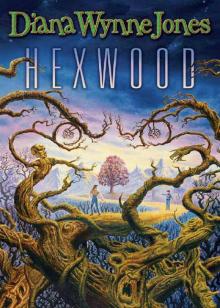 Hexwood
Hexwood Enchanted Glass
Enchanted Glass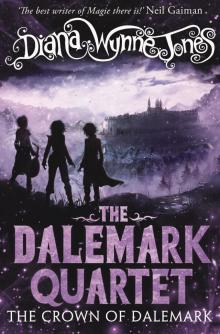 The Crown of Dalemark (UK)
The Crown of Dalemark (UK)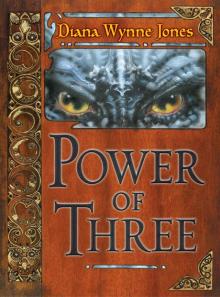 Power of Three
Power of Three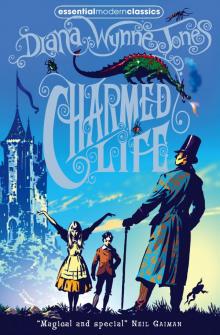 Charmed Life (UK)
Charmed Life (UK)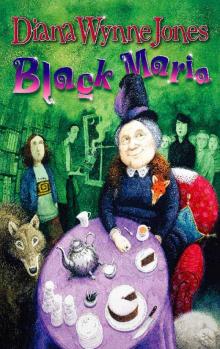 Black Maria
Black Maria The Islands of Chaldea
The Islands of Chaldea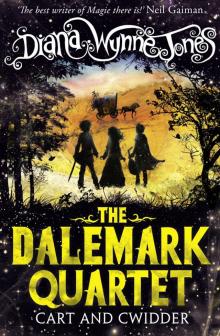 Cart and Cwidder (UK)
Cart and Cwidder (UK)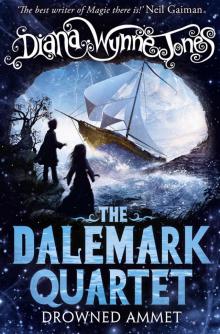 Drowned Ammet (UK)
Drowned Ammet (UK) Charmed Life
Charmed Life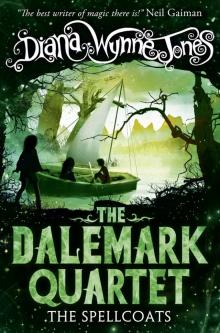 The Spellcoats (UK)
The Spellcoats (UK)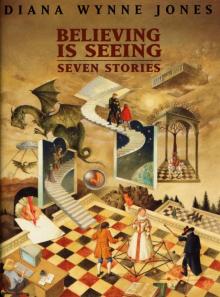 Believing Is Seeing
Believing Is Seeing Samantha's Diary
Samantha's Diary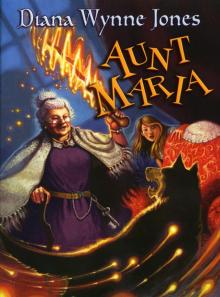 Aunt Maria
Aunt Maria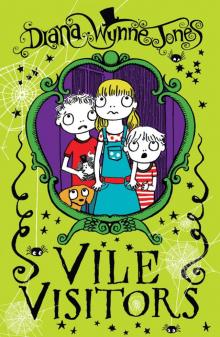 Vile Visitors
Vile Visitors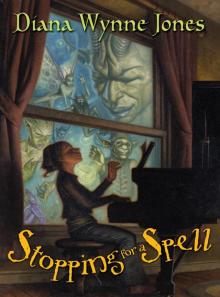 Stopping for a Spell
Stopping for a Spell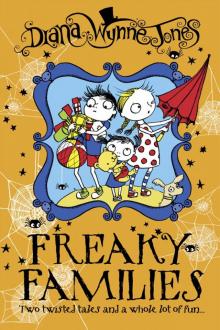 Freaky Families
Freaky Families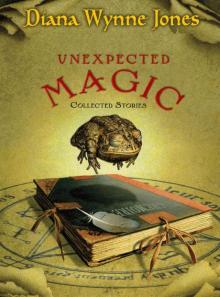 Unexpected Magic
Unexpected Magic Reflections
Reflections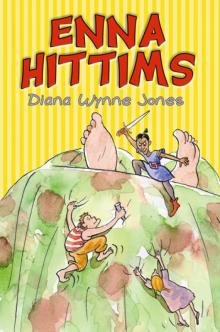 Enna Hittms
Enna Hittms Mixed Magics: Four Tales of Chrestomanci
Mixed Magics: Four Tales of Chrestomanci